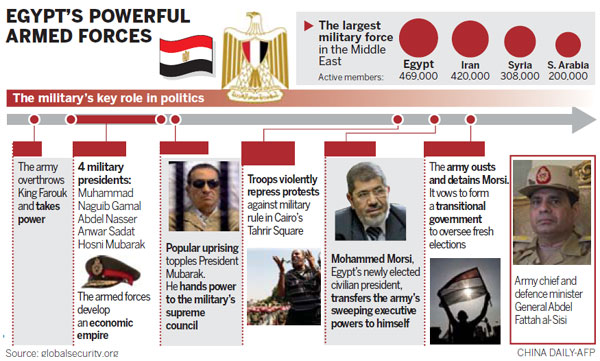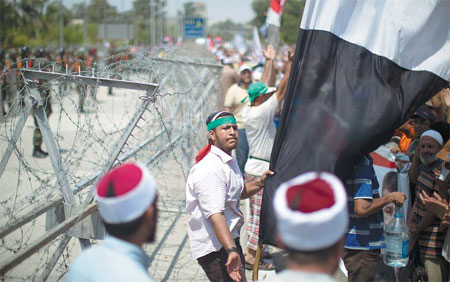Dispute over PM snags Egypt
|
Egyptian supporters of deposed president Mohammed Morsi wave a giant national flag in front of barbed wire fencing that blocks access to the headquarters of the Republican Guard in Cairo on Saturday. Egypt's Islamists vowed further protests on Sunday to demand the army restore the country's first democratically elected leader, after a day of clashes which saw 26 people killed. Mahmud Hams / Agence France-Presse |
ElBaradei's appointment as leader meets with opposition
The choice of Nobel Peace laureate Mohamed ElBaradei as Egypt's interim premier hit opposition within the coalition that backed Mohammed Morsi's ouster, as supporters and opponents of the deposed Islamist president planned rival rallies on Sunday.
The official MENA news agency said on Saturday that caretaker president Adly Mansour had appointed the outspoken liberal opponent of Morsi, only for his office to later deny any final decision had been taken.
Reporters had already assembled at the presidential palace for promised statements from Mansour and ElBaradei, which were then abruptly called off.
Salafi Islamists, who gave their backing to Morsi's overthrow in a military coup on Wednesday, were holding out against ElBaradei's appointment, officials close to the talks told AFP.
Presidential adviser Ahmed al-Muslimani said ElBaradei, the former head of the UN nuclear watchdog, remained the "strongest candidate". "He is on top of the list of names," Muslimani told AFP.
But by Sunday morning, after another round of talks, a senior Salafi politician said his Al-Nour party would not accept ElBaradei.
"Our position is simple. There are two reasons to reject ElBaradei: We need a technocratic economic figure; and we need to end polarization on the street," Nader Bakkar said.
"We can't talk of national reconciliation and then make Morsi's most ardent opponent prime minister," he said.
An official close to ElBaradei conceded there were fears of alienating Al-Nour, which won almost a quarter of votes in a 2011 parliamentary election, and "driving them" into Morsi's Muslim Brotherhood camp.
Meanwhile, the presidency held out an olive branch to Morsi supporters in the Brotherhood as its leaders vowed to press protests rejecting his ouster.
"We extend our hand to the Muslim Brotherhood," Muslimani told a news conference.
"I think the Muslim Brotherhood has many opportunities in the coming period to enter elections."
The initial reports of ElBaradei's appointment had been greeted with cheers in Cairo's Tahrir Square and Ittihadiya presidential palace, where opponents of Morsi set off firecrackers, frantically waved Egyptian flags and honked car horns.
The celebrations came as the Brotherhood staged a new show of force to demand the military restore Morsi to power, after 24 hours of violence that killed 37 people and injured more than 1,400.
Tamarod, the grassroots movement that organized the mass protests against Morsi that prompted the army to intervene, called for new demonstrations on Sunday to counter the Islamists, raising fears of more unrest.
Morsi, who has been in detention since Wednesday night, had issued a defiant call for his supporters to defend his "legitimacy" as Egypt's first freely elected president, in a recorded speech released shortly after his ouster.
Friday's violence erupted despite talk of peaceful protests, with Cairo and the Mediterranean city of Alexandria the hardest hit.
The bloodletting continued on Saturday with gunmen killing a Coptic Christian priest in the Sinai Peninsula.
Militants in the Sinai also blew up a gas pipeline to Jordan, for the first time in nearly a year, as soldiers and police came under attack by Islamist gunmen.
On Friday, armed Morsi supporters had stormed the North Sinai provincial headquarters in the town of El-Arish and raised the black banner of al-Qaida-inspired militants, an AFP correspondent reported.
Morsi's single year of turbulent rule was marked by accusations he failed the 2011 revolution by concentrating power in Brotherhood hands and letting the economy nosedive.
President Barack Obama, meanwhile, said the United States was "not aligned" with any political party or group in Egypt following Morsi's ouster.
Obama, who spoke with members of the National Security Council by conference call, "condemned the ongoing violence across Egypt and expressed concern over the continued political polarization", according to a White House statement.
"The United States categorically rejects the false claims propagated by some in Egypt that we are working with specific political parties or movements to dictate how Egypt's transition should proceed," the statement said.

(China Daily 07/08/2013 page12)









